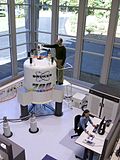During nuclear magnetic resonance observations, spin–lattice relaxation is the mechanism by which the longitudinal component of the total nuclear magnetic...
12 KB (1,602 words) - 18:13, 27 May 2024
spin–spin relaxation time, known as T2, a time constant characterizing the signal decay. It is named in contrast to T1, the spin–lattice relaxation time...
10 KB (1,100 words) - 18:04, 10 December 2024
equilibrium value is termed spin-lattice relaxation while the loss of phase-coherence of the spins is termed spin-spin relaxation, which is manifest as an...
26 KB (3,762 words) - 18:52, 20 June 2024
independent relaxation processes of T1 (spin-lattice; that is, magnetization in the same direction as the static magnetic field) and T2 (spin-spin; transverse...
93 KB (10,810 words) - 11:16, 31 May 2025
thus the population) from nuclei with different values for the spin-lattice relaxation (T1), the overall time for the experiment is reduced. Is a very...
2 KB (184 words) - 19:18, 18 July 2023
Nuclear Overhauser effect (section Relaxation)
transfer of nuclear spin polarization from one population of spin-active nuclei (e.g. 1H, 13C, 15N etc.) to another via cross-relaxation. A phenomenological...
35 KB (4,788 words) - 04:26, 25 May 2025
and by the spin-spin relaxation time T2, which describes the vanishing time of the magnetization in the xy-plane. The spin-lattice relaxation results from...
18 KB (2,615 words) - 15:37, 15 April 2024
protons will return to the low energy state by the process of spin-lattice relaxation. This appears as a magnetic flux, which yields a changing voltage...
47 KB (6,859 words) - 17:45, 15 April 2025
PMID 17677870. S2CID 7768497. Yafet, Y. (1963), g Factors and Spin-Lattice Relaxation of Conduction Electrons, Solid State Physics, vol. 14, Elsevier...
29 KB (4,420 words) - 23:45, 23 May 2025
Electron paramagnetic resonance (redirect from Electron spin resonance spectroscopy)
ns long are used to control the spins in the Bloch sphere. The spin–lattice relaxation time can be measured with an inversion recovery experiment. As...
52 KB (7,148 words) - 12:04, 25 May 2025
MRI pulse sequence (redirect from Turbo spin echo)
independent relaxation processes of T1 (spin-lattice; that is, magnetization in the same direction as the static magnetic field) and T2 (spin-spin; transverse...
30 KB (3,981 words) - 06:40, 2 June 2025
property which is often detrimental for NMR spectroscopy as the spin-lattice relaxation times are very short, leading to excessively broad peaks. However...
7 KB (580 words) - 21:25, 24 May 2025
resonance (NMR) because of their prolonged relaxation times, both T1 (spin-lattice relaxation) or T2 (spin-spin relaxation). Damadian was the first to perform...
38 KB (4,579 words) - 19:48, 24 May 2025
Nuclear magnetic resonance (section Relaxation)
the spin system to equilibrium faster than other mechanisms of relaxation. RD can result in line broadening and measurement of a shorter spin-lattice relaxation...
93 KB (11,871 words) - 14:30, 29 May 2025
Ising model (redirect from Spin lattice)
dipole moments of atomic "spins" that can be in one of two states (+1 or −1). The spins are arranged in a graph, usually a lattice (where the local structure...
126 KB (20,177 words) - 22:25, 22 May 2025
quantum spin liquid state was first proposed by physicist Phil Anderson in 1973 as the ground state for a system of spins on a triangular lattice that interact...
45 KB (4,623 words) - 07:44, 6 April 2025
magnetic spins all align in the same direction; this is analogous to a crystal's lattice-based structure. The individual atomic bonds in a spin glass are...
37 KB (4,932 words) - 18:51, 28 May 2025
characteristic of this complex allows researchers to inversely measure spin-lattice relaxation times as they are related to the concentration of proteoglycan...
9 KB (698 words) - 15:58, 19 May 2025
is affected. By utilizing the magnetic spin of nuclei under RF magnetic fields, and their spin-lattice relaxation properties after excitement from the external...
19 KB (2,497 words) - 15:30, 4 October 2024
interactions. Since molecular oxygen is paramagnetic it causes 19F NMR spin lattice relaxation (R1): specifically a linear dependence R1= a + bpO2 has been reported...
14 KB (1,325 words) - 20:27, 3 May 2025
undergo cross relaxation by a mechanism related to spin–lattice relaxation. In NOESY, the nuclear Overhauser cross relaxation between nuclear spins during the...
29 KB (3,715 words) - 22:58, 3 June 2025
complexes, throughout the whole lattice. A transparent account of cooperative lattice effects is the mechano-elastic model of spin transition, developed in terms...
19 KB (2,502 words) - 15:07, 23 May 2025
Hyperpolarization (physics) (section Relaxation: T1)
alveolar dimensions which is disseminated at atmospheric pressure. Spin lattice relaxation was reasonably long enough so it is applicable in vivo system although...
65 KB (8,328 words) - 20:36, 21 April 2025
intensities are unreliable because some carbons have a larger spin-lattice relaxation time and others have weaker NOE enhancement. In gated decoupling...
17 KB (1,877 words) - 04:17, 9 June 2024
separation axiom T 1 {\displaystyle \mathbb {T} ^{1}} , the 1-torus Spin–lattice relaxation time in nuclear magnetic resonance and magnetic resonance imaging...
5 KB (724 words) - 13:04, 13 May 2025
dilute-limit to eliminate homonuclear probe interactions. The spin–lattice relaxation of the probe is monitored by the parity-violating beta-decay of...
51 KB (5,450 words) - 16:52, 22 May 2025
spectra. He then published a series of elegant papers on spin-spin and spin-lattice relaxation in high resolution spectra, demonstrated some of the earliest...
12 KB (1,003 words) - 14:30, 31 May 2025
proteoglycan content of articular cartilage using the spin-lattice relaxation time or T1 relaxation time. Current research is investigating the clinical...
3 KB (263 words) - 05:12, 20 March 2025
ISSN 1882-0778. S2CID 118103069. Yafet, Y. (1963). "g Factors and Spin-Lattice Relaxation of Conduction Electrons". Solid State Physics. 14: 1–98. doi:10...
22 KB (3,241 words) - 18:26, 23 February 2025
high gas solubility, and hence strong nuclear magnetic resonance spin lattice relaxation rate (R1) response to changes in pO2. Molecular symmetry provides...
6 KB (525 words) - 16:41, 19 April 2025















